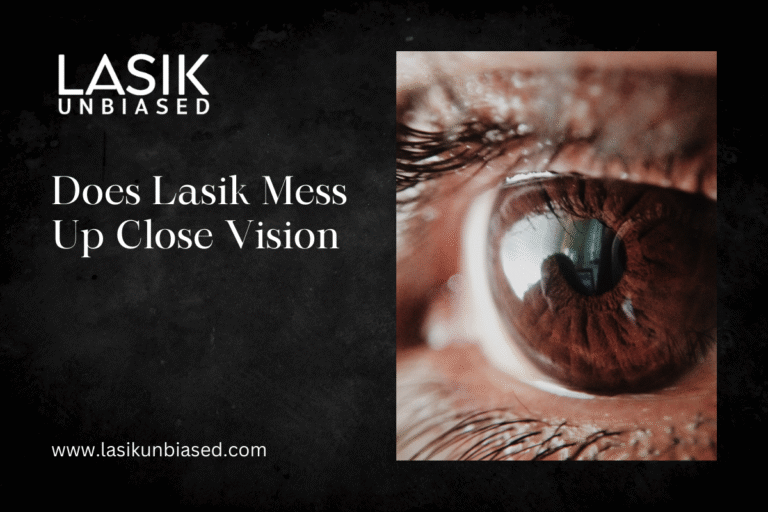No, LASIK does not inherently “mess up” close vision, but individuals may notice changes depending on their age and pre-existing eye conditions.
Understanding these potential changes can help set realistic expectations for anyone considering the procedure.
How LASIK Affects Vision?
What LASIK Does to Your Eyes?
LASIK, or Laser-Assisted in Situ Keratomileusis, is a quick and effective eye surgery designed to correct vision problems like nearsightedness, farsightedness, and astigmatism. By reshaping the cornea, it helps your eyes focus light properly on the retina, giving you sharper, clearer vision. Its primary goal is to reduce or eliminate the need for glasses or contact lenses.
However, the changes LASIK makes to the cornea are permanent. While the procedure is incredibly effective at correcting distance vision, its impact on close-up vision might vary based on factors like the patient’s age and their pre-existing eye conditions.
The Role of Age in Close Vision Changes
One critical factor to consider is age. Around the age of 40, most people begin to develop a condition called presbyopia. Presbyopia is a natural age-related condition that affects the eye’s ability to focus on close-up objects. The lens inside the eye becomes less flexible, resulting in difficulty reading small print or seeing close objects clearly.
LASIK does not prevent or cause presbyopia, but patients who undergo the procedure may believe their close vision has worsened because they are no longer reliant on corrective lenses for distance, which might have previously addressed their near vision as well.
Why Some People Think LASIK Impacts Close Vision?
Pre-Existing Conditions
Patients with previous high levels of nearsightedness might be accustomed to seeing objects up close without glasses. After LASIK, their distance vision is corrected, but near vision may require reading glasses due to the loss of near-sighted benefits they once experienced without correction. This shift can give the impression that LASIK has “messed up” their close vision.
Monovision and Close Vision
Some LASIK candidates opt for ‘monovision,’ where one eye is intentionally undercorrected for near vision while the other is fully corrected for distance. This approach can reduce dependence on reading glasses, especially for those with presbyopia.
While monovision can be highly effective for addressing both near and far vision challenges, it requires an adjustment period, and not everyone finds it comfortable or satisfactory. For those who do, it can reduce or eliminate the need for reading glasses.
Unrealistic Expectations
LASIK is primarily used to correct distance vision, but modifications like monovision can help address near vision. However, it does not halt the natural ageing of the eye, including the onset of presbyopia. When patients expect a permanent fix for all vision issues—including inevitable conditions like presbyopia—they may feel LASIK has affected their close vision unfairly.
How to Preserve Close Vision Post-LASIK?
Know Your Options for Presbyopia
If you’re 40 or older and considering LASIK, speak with your ophthalmologist about presbyopia. They will assist you in exploring options such as monovision or additional procedures to address near vision. Having a realistic understanding of how LASIK interacts with natural ageing processes will prevent surprises later.
Consider Reading Glasses
For individuals with perfect distance vision after LASIK surgery, reading glasses may become necessary as presbyopia progresses. This adjustment is a normal aspect of life and is not a result of the LASIK procedure.
Take Care of Your Eyes
Healthy habits can support overall eye health and reduce the strain that may exacerbate vision issues. These include:
- Taking regular breaks from screens.
- Ensuring proper lighting when reading or working on close tasks.
- Scheduling regular eye exams to catch any changes early.
LASIK Success Rates and Satisfaction
Most LASIK patients report high levels of satisfaction after surgery. According to recent studies, more than 95% of patients are satisfied with their outcomes, feeling that it improves their quality of life significantly. However, clear communication during the consultation process is essential to ensure patients understand what changes, if any, might occur post-surgery.
Is LASIK Right for You?
Before proceeding with LASIK, speak openly with your surgeon about your vision goals. Consider questions like:
- How will LASIK affect my near and distance vision?
- Am I a good candidate for monovision?
- What are the alternatives if I’m concerned about close vision?
Factors to Discuss During Your LASIK Consultation
During your consultation, make sure to discuss:
- Your Age and Lifestyle
It is essential to understand how presbyopia may affect you to ensure long-term satisfaction.
- Your Vision Goals
Your preference for near vision or distance vision will influence your available LASIK options, such as monovision.
- Your Current Eye Health
Your surgeon will assess whether conditions like chronic dry eye or high myopia might influence your results.
- Alternative Treatments
Procedures such as Refractive Lens Exchange (RLE) might better suit candidates primarily concerned about near vision.
Final Thoughts on LASIK and Close Vision
To conclude, LASIK does not inherently compromise close vision, but the procedure may lead to shifts in how you perceive your near vision. Factors like age, presbyopia, and previous vision conditions play critical roles in how patients experience their vision after LASIK. The best way to set yourself up for a successful outcome is to have a detailed consultation with your surgeon, where you discuss your lifestyle and vision priorities openly.
If you’re considering LASIK, ensure you work with a reputable surgeon to make an informed and personalised decision. Armed with the right information, you can confidently move toward a life with a clearer vision and fewer limitations.


